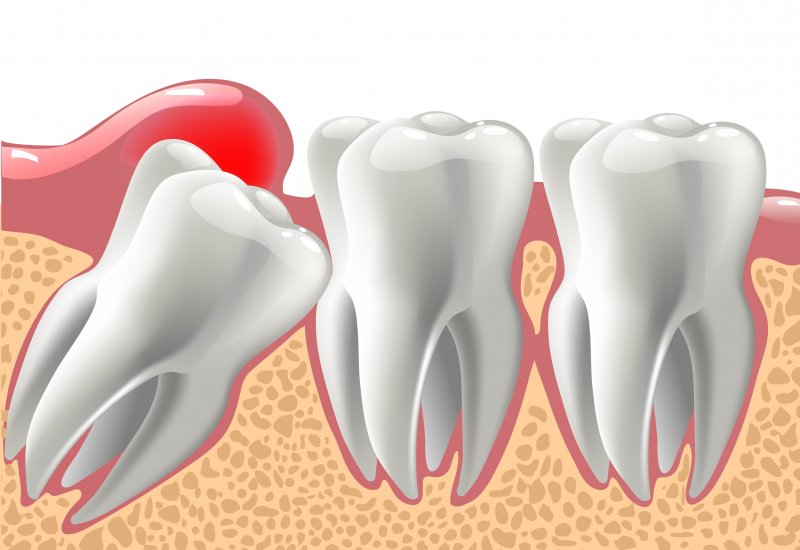
Wisdom teeth are often unable to erupt properly due to a lack of space in the mouth. As a result, they can become impacted, meaning they’re partially or fully trapped under the gums. An impacted wisdom tooth needs to be removed quickly before it can lead to adverse health effects. But how can you tell if a wisdom tooth is impacted? Here are 5 possible warning signs to look for.
1. Pain in the Back of Your Mouth
Frequent or constant pain in the back of your mouth is one of the most common signs of impacted wisdom teeth. You may experience sharp pain or discomfort when you yawn or chew your food; some patients might also notice that their teeth are more sensitive to hot or cold foods. In some cases, wisdom tooth pain manifests as a chronic dull ache. Regardless of what form your pain takes, you should take it as a sign to have your mouth examined as soon as possible.
2. Shifting Teeth in the Area
Sometimes impacted wisdom teeth are attempting to erupt at the wrong angle, causing them to push into the neighboring teeth. As such, you may notice that the teeth near the back of your mouth have started to move out of alignment, or they may even start to feel somewhat loose. Waiting too long will make this particular issue even worse, so it’s important to make an appointment promptly.
3. Changes in Your Bite
If the wisdom teeth cause the teeth to significantly change their positions, it can change the way your bite fits together. This can be deceptively dangerous; a misaligned bite will not distribute the pressures of biting and chewing properly throughout your mouth, which means specific teeth might wear down at an accelerated rate.
4. Swelling or Inflammation
Impacted wisdom teeth might cause uncomfortable swelling in the jaw, or it may contribute to inflammation in the glands between the neck and shoulders. In some cases, the swelling might even be a sign that the wisdom tooth has caused an infection, in which case it definitely needs to be removed at the earliest possible opportunity.
5. Bad Breath
Impacted wisdom teeth sometimes create tiny fissures in the mouth where bacteria can become trapped. If these bacteria aren’t removed, they can start to produce a foul odor, leading to bad breath that does not go away even with frequent brushing.
If you haven’t had your wisdom teeth removed yet, then any of the symptoms listed above could be a sign that you need to call your dentist or oral surgeon immediately. Impacted wisdom teeth are a grave threat to your oral health, and you need to have them taken care of right away if you want to avoid the worst-case scenario.
About the Author
Dr. Jeff Lee completed his residency in Oral and Maxillofacial Surgery at the Ohio State University Medical Center. Today at Muskingum Valley Oral Surgery in Cambridge, he offers state-of-the-art surgical solutions for various oral health problems; this includes comfortable, safe removal of impacted wisdom teeth. To schedule a consultation with Dr. Lee, visit his website or call (740) 432-8768.
